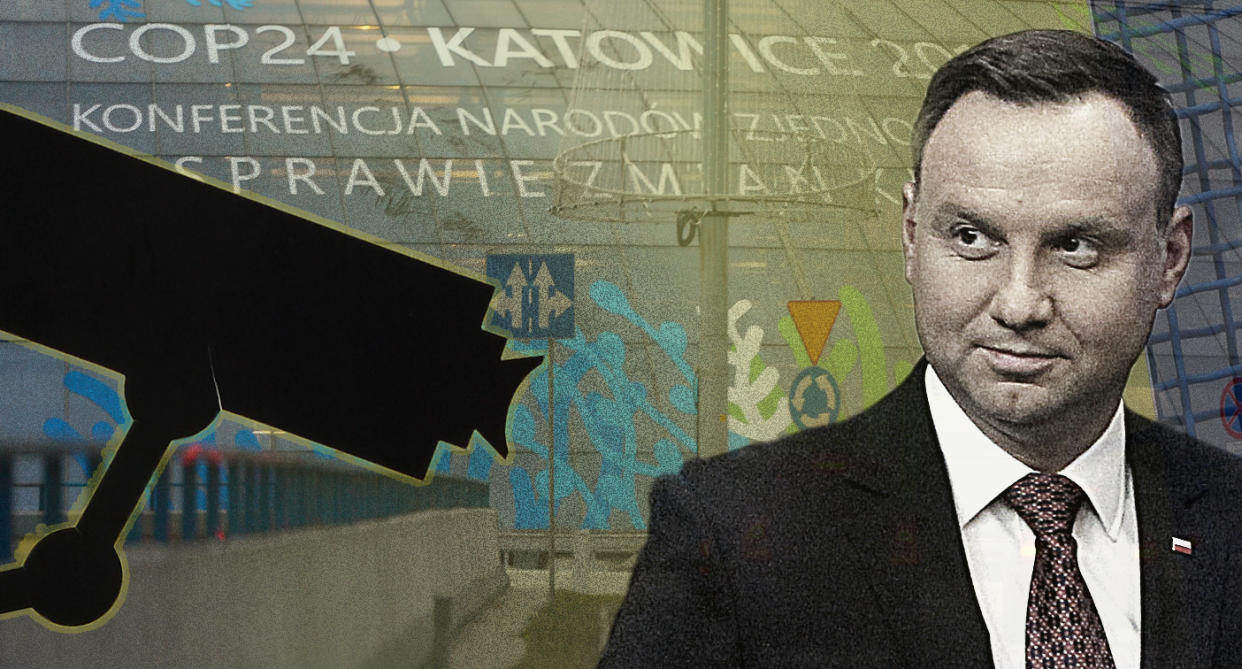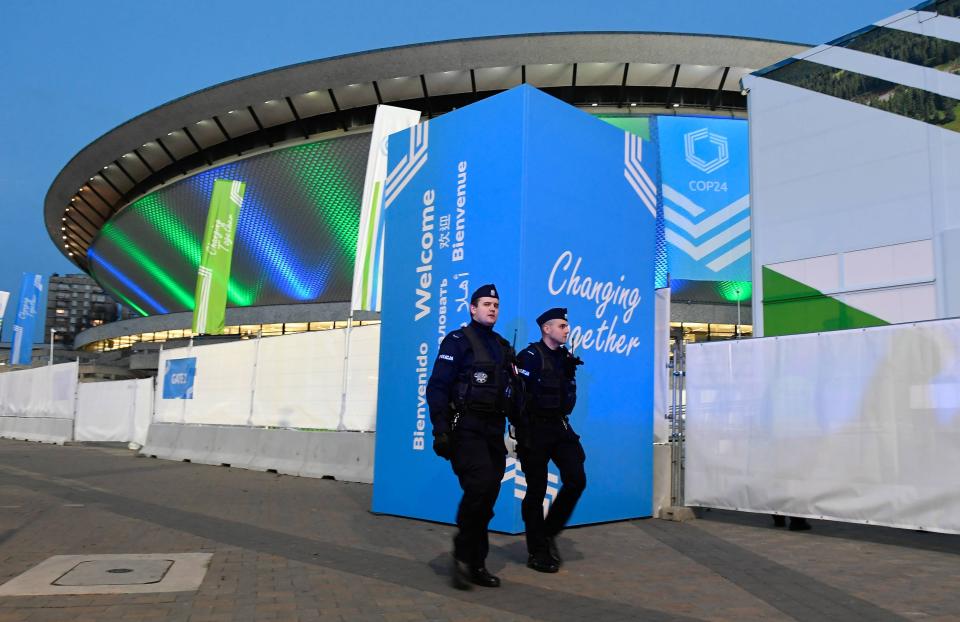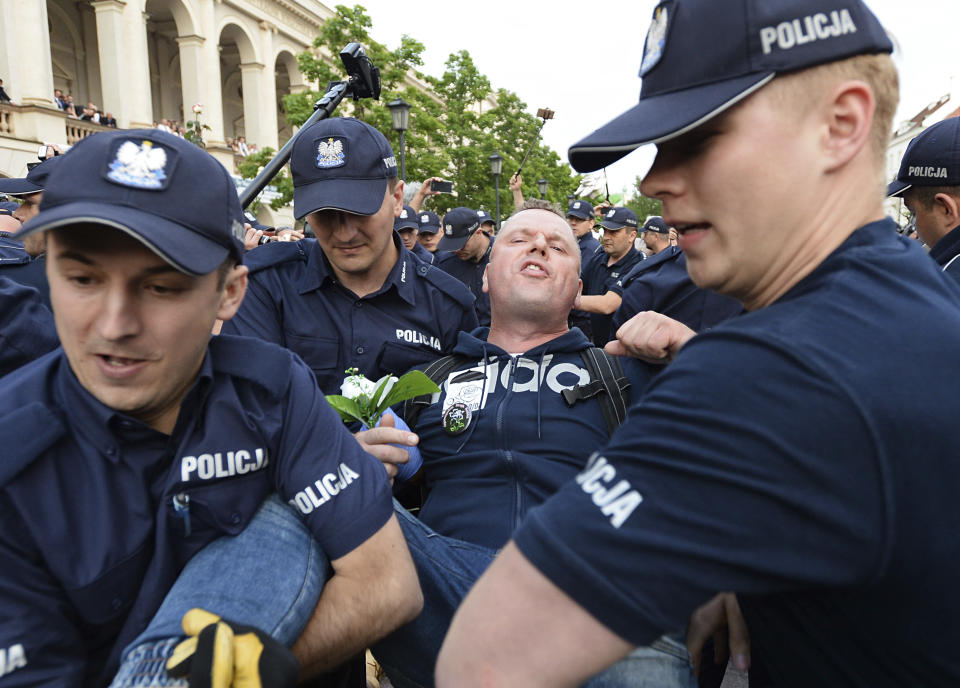Poland defends law targeting protests, personal data at climate summit

The Polish government is defending a law that limits protest and privacy rights for participants at an international climate conference taking place next month in the southern city of Katowice.
National representatives from member states of the U.N. Framework Convention on Climate Change are meeting from Dec. 2 – Dec. 14 with the aim of establishing rules for checking that countries are fulfilling the promises they made three years ago in Paris. They are also finishing “the Talanoa Dialogue,” which was a period for nations and NGOs to share their concerns and ideas to help build consensus for next steps and encourage countries to increase their CO2-reduction targets.
Scientists say the Paris Agreement’s goal of limiting the increase in average global temperature to below 2°C would prevent the most devastating consequences of manmade climate change.
But a growing number of international NGOs argue that a Polish law threatens the success of COP24, a critical climate conference dubbed “Paris 2.0.”
The controversy arises from a law Polish President Andrzej Duda signed last January that allows authorities to collect personal data on conference participants without their knowledge or consent. The bill also bans spontaneous demonstrations in Katowice, requiring protesters to get permission from the city beforehand.
Lydia Gall, a researcher on Eastern Europe for Human Rights Watch (HRW), said the prohibition on spontaneous protests in Katowice is particularly concerning for events like COP24, where activists often need the ability to respond quickly to developments at the conference.
“This law as it stands makes that Illegal. This could lead to potential clashes and criminalization of activists,” Gall told Yahoo News. “The role of civil society and environmental activists in climate talks is extremely important in providing useful information to policy makers, and their active participation should be empowered and encouraged.”

She said preventing nongovernmental groups from responding to developments freely and organizing peaceful protests when necessary seriously undermines their rights.
“The fact that the law enables police to collect data on environmental activists without their knowledge or judicial review is worrying,” Gall said. “That data may be used to track, monitor or even spy on environmental activists and indigenous leaders participating in the conference.”
In response to questions from Yahoo News, the Polish embassy in Washington, D.C., said the government is determined to run an open dialogue with all organizations represented at the conference.
“The Ministry of the Environment wants to ensure that each COP24 participant will be warmly welcomed as a very important guest whose presence and activity will contribute to the most important aim of the COP24 Presidency, which is to provide a transparent, impartial and open for all parties negotiating process,” the embassy said in an emailed statement.
According to the Polish government, the regulations for public assemblies do not differ from those in other European Union countries that require protest organizers to apply for permission to hold events. At the same time, the email continued, the organizer is responsible for “the lawful conduct” of its activities.
Poland’s prohibition on “participation in spontaneous assemblies” only applies to Katowice from Nov. 26 until Dec. 16. The Polish government argues this is not an unreasonable burden on activists.
“The date of the COP 24 Conference is known,” the embassy wrote. “Therefore, it is possible to ‘book’ in advance, by interested parties, organizing in Katowice from November 26, 2018 to December 16, 2018, meetings, marches, or other forms of public manifestation of their views by various groups of observers.”

But Sébastien Duyck, a senior attorney at the Center for International Environmental Law, said the Polish law created a division between the government and civic society groups that’s “very unhelpful and frustrating.”
“The message that was sent, the symbolic nature of having this law, and the very specific provisions about human rights has already had a very negative impact for many civil society groups that had planned to attend the COP,” Duyck told Yahoo News.
He said several NGOs have decided not to attend the COP or to reduce the number of delegates because of security concerns. He said climate activists from developing countries without reliable civil liberty protections are particularly worried about what their governments might do after learning of their activities through such surveillance.
“Europeans and Americans may be a little less concerned about police having information about us, but for some of the activists from developing countries, this is extremely worrying,” he said. “They don’t know what kind of regime change might happen or what will be done with any information collected about you.”
The Asia Pacific Forum on Women, Law and Development, for instance, said the bill would deter important representation from their region, and argued that the U.N.’s decision to work with “oppressive governments like Poland” violates the international body’s own principles on human rights.

Barbora Cernusakova, a researcher for Amnesty International based in London, said the tenor of the law is security but she questions its proportionality. Poland, she said, had already extended the surveillance powers of the law enforcement agencies in 2016.
“When it comes to metadata, there is very little regulation or restriction. The authorities can collect it without any authorization,” she said. “When it comes to other personal data, law enforcement agencies are actually capable of collecting them without any authorization for five days in case there is suspicion. If they are going to do it for longer than five days, then they need to seek authorization of a court.”
She said the recent clampdown on protests should be seen within a larger trend toward limiting civil liberties in Poland.
Amnesty International has expressed broader concerns about the Polish government’s attempts to restrict human rights and curtail peaceful protests. The organization’s June 2018 report, “The Power of ‘the Street,’” documents how legislation adopted in December 2016 expanded law enforcement’s surveillance powers.
According to the Amnesty report, Polish citizens do not know when they are under surveillance, and participating in a protest could result in harassment or prosecution.
“Those who participate in protests in Poland are frequently threatened with detention and prosecution, if not outright violence at the hands of police or security officers,” the report says.
What’s yet to be seen is the impact of the Polish law on the actual success of the conference, which experts say is critical to the future of international cooperation on climate change.

Dan Bodansky, a law professor at Arizona State University and a leading climate change expert, said COP24 is more significant than the prior year’s meeting in Bonn, Germany, because more needs to be accomplished.
“How well the conference does in accomplishing these tasks, which are needed to keep the Paris Agreement on track to progressively ratchet up ambition, or not is the key question of Katowice,” Bodansky told Yahoo News.
Climate champions had hoped that the Paris Agreement would settle the political disagreements so that future conferences could focus more on technical guidelines and establishing strong rules. But ongoing political debates have hindered the development of strong rules.
President Trump’s announcement in June 2017 that he had decided to pull the U.S. from the Paris Agreement was mostly symbolic at this point. Under the accord’s 28th article, the earliest he can submit the United States’ withdrawal is November 2019, and it would take effect in 2020. Nevertheless, the international community is adjusting to this new dynamic without U.S. leadership, and Americans have a smaller seat at the table for climate talks.
The White House released a congressionally mandated report on Black Friday about the catastrophic impact climate change will have on American infrastructure, public health and the economy.
The question that remains is whether COP24 participants can set aside their differences to adopt a strong Global Climate Action Playbook.
“I think the rules that come out of Katowice will be a step forward, but be modest and not be as robust as some people had hoped for going into the process,” Bodansky said.
_____
Read more from Yahoo News:
Trump asks why Mueller hasn’t interviewed ‘hundreds’ of campaign staffers
George Conway: Republican Party has become a ‘personality cult’ under Trump
Trump administration defends asylum crackdown after judge’s ruling
An American killing: Why did the U.S. Park Police fatally shoot Bijan Ghaisar?
Cory Booker: I will ‘take some time over the coming months’ to consider 2020 bid
PHOTOS: President and first lady Trump attend National Christmas Tree lighting



